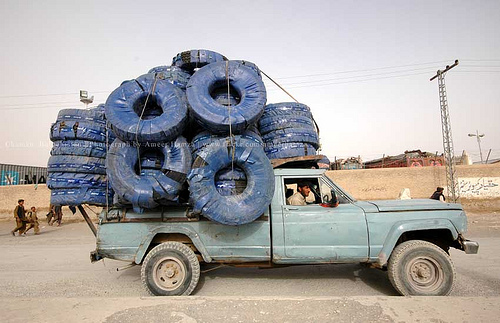“Pakistan is losing a monumental $2.63 billion worth of revenue a year, thanks to smuggling of just 11 goods that are making their way through porous borders and, more alarmingly, through high sea and containerized cargo with the full support of the state machinery, reveals a highly confidential official report.
The losses were calculated by aggregating numerous customs duties and state taxes as were applicable at the time of the study, i.e., last year.
The country’s first-ever comprehensive report has estimated the value of these 11 goods at $9.1 billion. The revenue lost in the form of duties and taxes on smuggled goods could be far higher than $2.63 billion or Rs276 billion if the scope of the study is widened to all the smuggled goods.
The amount is higher than the additional taxes the government levied in July last year through its second budget.
The study considered the impact of smuggling high-speed diesel, vehicles, tires, tea, auto parts, mobile phones, garments, cigarettes, plastic, television sets and steel sheets.
The Federal Board of Revenue (FBR) commissioned the study titled, ‘Ascertain the Market Demand of Goods Prone to Smuggling -Establishing the Volume of Smuggling’ but later termed it ‘strictly confidential.’
The lead investigator for the report was Tariq Huda, the Collector of Customs Preventive, Karachi, who completed the work in May last year.
The FBR top brass buried the report instead of taking any action, as the findings suggested that the massive smuggling scale was impossible without the active involvement of many high-profile government functionaries.
At the time of the study, Nisar Mohammad Khan was Member Customs of FBR, and in November last year, he was promoted to FBR chairman.
The report says, “Considering the border as the primary source of smuggled would be a devastating mistake … the goods are coming in from multiple sources including the high sea and in containerized cargo with officials fully aware and involved in their transport”.
Curbing smuggling through the sea is the responsibility of the Maritime Security Agency or the Coast Guards, who have also failed to perform their duties, as shown by the findings.
“The border areas are almost entirely operated by the Frontier Constabulary (FC) with no checks on the misuse of Customs Powers delegated to them,” it noted.
It did say that a large quantity of the smuggling was due to Afghan Transit Trade Agreement (ATTA) cargo.
It also underlined that “enforcement remains the biggest policy option Pakistan Customs needs to pursue” to curb the smuggling.
The country can increase its tax-to-GDP ratio by another 3.9% to 15% within a year by curbing smuggling. Compared to India’s smuggling to GDP ratio of only 0.43% and Bangladesh’s 0.04%, Pakistan’s ratio is incredulously high, largely owing to the involvement of the FBR officials, FC, Coast Guards and Maritime Agency.
“Majority of the foreign investment has left the country, and more is leaving, as they cannot compete with the profit margins, which smuggled goods generate for those involved,” lamented the study.
The study notes that reducing tariffs to curb smuggling has not worked thus far; it has rather had a detrimental effect on the domestic industry, which would have to compete with even cheaper imports.
Out of $2.63 billion losses, the country sustained $1.1 billion losses due to the smuggling of mobile phones. The estimated value of smuggled phones was $4.4 billion, and the smuggled phones met 59% of the demand.
The $2.7 billion smuggled diesel was the second item that caused $874 million in losses, as the country met 33% of its total demand through smuggled diesel. The losses would go even higher for the current year as the government charges an abnormally high rate of 51% General Sales Tax on diesel.
Smuggled plastics caused losses of $222 million in, capturing 11% of the market demand. The smuggled auto parts caused $186 million in losses, capturing 57% of the market. The smuggled vehicles caused $175 million in losses and captured 12% of the market. Finally, the smuggled tires caused $118.5 million in losses, meeting 59% of the market demand.
The smuggled steel sheets comprised 10% of the market and caused $112.6 million in losses. 59% of the market needs are met by smuggled tea, causing $77 million in losses. Only 3% of the market needs are met from smuggled cigarettes, causing $27 million in losses.
Similarly, smuggled television sets have captured 57% of the market, causing $9 million in losses, while smuggled garment products have captured 17% of the market, causing $2.5 million in revenue losses.






